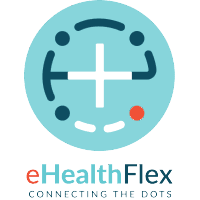Best Hospital ERP Software
Best Hospital ERP software solutions for small-scale entities are Halemind, iceApple, SolutionDots, Focus X, Medstar HIS, and Tryton. These platforms streamline operations to save time and enhance efficiency.



No Cost Personal Advisor
List of 20 Best Hospital ERP Software
Contenders | 2024
Best-in-class Cloud Accounting & Financial Managem
Sage Intacct is a cloud-based financial statement solution designed for small and mid-sized businesses. This robust and innovative software automates critical finance and accounting processes besides providing users with real-time financial insights. Read Sage Intacct Reviews
Explore various Sage Intacct features, compare the pricing plans, and unlock the potential of seamless operations by selecting the right software for your business.
Features
View all Sage Intacct Features- Forecasting
- Multi-Department/Project
- Expense Tracking
- Multi Location
- Budgeting and planning
- Receipt Management
- Financial Management
- Purchasing
Sage Intacct Caters to
- StartUps
- SMBs
- Agencies
- Enterprises
Emergents | 2024
Software by Elinext Group
eliNext is an effective solution for Healthcare CRM. Inbuilt with intelligent features like patient management, contact management, invoicing, document management and proactive manage etc. Specially designed to improve the healthcare services with parallelly reduce the management costs. Learn more about Elinext
Explore various Elinext features, compare the pricing plans, and unlock the potential of seamless operations by selecting the right software for your business.
Features
View all Elinext Features- Physician Management
- Marketing Automation
- Campaign Management
- Audience Targeting
- Medical History Record
- Patient Management
Elinext Caters to
- StartUps
- SMBs
- Agencies
- Enterprises
Emergents | 2024
Highly secured, user friendly, reliable and seamle
Lifeline E-Clinic is an exclusive mini ERP system which helps in the systematic management of a Hospital. It Covers the complete work flow of a General Practitioner and Specialist Clinics. Learn more about Lifeline e-clinic
Explore various Lifeline e-clinic features, compare the pricing plans, and unlock the potential of seamless operations by selecting the right software for your business.
Features
View all Lifeline e-clinic Features- HRM
- EMR / EHR
- Appointment Management
- Electronic Claims
- Clinical Care
Lifeline e-clinic Caters to
- StartUps
- SMBs
- Agencies
- Enterprises
Emergents | 2024
Software by Aes Technologies India Private Limited
iceApple is a fully featured Hospital Management Software designed to serve Agencies, Startups. iceApple provides end-to-end solutions designed for Windows. This online Hospital Management system offers Inventory Management, Out-Patient Management, In-Patient Management, Physician Management, Patient Records Management at one place. Learn more about iceApple
Explore various iceApple features, compare the pricing plans, and unlock the potential of seamless operations by selecting the right software for your business.
Features
View all iceApple Features- Patient Records Management
- Medical Billing
- In-Patient Management
- Appointment Scheduling
- Bed Management
- Physician Management
- Claims Management
- Accounting Integration
iceApple Caters to
- StartUps
- SMBs
- Agencies
- Enterprises
Emergents | 2024
Software by ALTEN Calsoft Labs
ALTEN Calsoft Labs is a fully featured IoT Software designed to serve SMEs, Enterprises. ALTEN Calsoft Labs provides end-to-end solutions designed for Macintosh. This online IoT system offers Data Collection, Configuration Management, Data Management, Device Management, Visualization at one place. Learn more about ALTEN Calsoft Labs
Explore various ALTEN Calsoft Labs features, compare the pricing plans, and unlock the potential of seamless operations by selecting the right software for your business.
Features
View all ALTEN Calsoft Labs Features- Data Collection
- Device management
- Configuration Management
- Performance Management
- Connectivity Management
- Data Management
- Visualization
ALTEN Calsoft Labs Caters to
- StartUps
- SMBs
- Agencies
- Enterprises
Emergents | 2024
Fully integrated hospital management software
Enhance your hospital operation with one of the best and largest selling hospital ERP software in India. Hospital ERP software by Software Associates has been enpowering hospitals across India by providing an integrated solution for managing all hospital operations. Learn more about VIKAS - Hospital ERP Softaware
Explore various VIKAS - Hospital ERP Softaware features, compare the pricing plans, and unlock the potential of seamless operations by selecting the right software for your business.
VIKAS - Hospital ERP Softaware Caters to
- StartUps
- SMBs
- Agencies
- Enterprises
Category Champions | 2024
Transform Your Business With ebizframe ERP
ebizframe ERP is a Next-Generation, SMAC Enabled, Full-Feature ERP Solution with a leadership presence in India, Africa, and the Middle East. It has been successfully implemented for 1,100+ clients in 25 countries across 20+ verticals. Read ebizframe ERP Reviews
Explore various ebizframe ERP features, compare the pricing plans, and unlock the potential of seamless operations by selecting the right software for your business.
Features
View all ebizframe ERP Features- Work order management
- Manufacturing
- Distribution Management
- Multicurrency payment processing
- Employee Management
- Accounts Receivable
- General Ledger
- Supplier and Purchase Order Management
ebizframe ERP Caters to
- StartUps
- SMBs
- Agencies
- Enterprises
Emergents | 2024
Software by Solutiondots
SolutionDots is one of the best and cloud-based ERP software has been created from the software cutting edge ERP arrangement. It provided very fast and real-time information reports in the control environment. Learn more about SolutionDots
Explore various SolutionDots features, compare the pricing plans, and unlock the potential of seamless operations by selecting the right software for your business.
Features
View all SolutionDots Features- Accounting Management
- Financial Accounting
- Document Management
- Sales Management
- General Ledger
- Business process modeling (BPM)
- Supplier and Purchase Order Management
- Business intelligence (BI)
SolutionDots Caters to
- StartUps
- SMBs
- Agencies
- Enterprises
Category Champions | 2024
Accelerate | Innovate | Compete
An all-in-one cloud ERP that provides real-time visibility and automation of fundamental company operations for operational excellence. AI and machine-learning-driven statistics, predictive analytics, and forecasting are all available. Read Focus ERP Reviews
Explore various Focus ERP features, compare the pricing plans, and unlock the potential of seamless operations by selecting the right software for your business.
Features
View all Focus ERP Features- Usability Testing
- Order Management
- Barcode Scanning
- Templates
- Production Options Evaluation
- Task Management
- Catalog Management
- Multicurrency payment processing
Focus ERP Caters to
- StartUps
- SMBs
- Agencies
- Enterprises
Contenders | 2024
Top Hospital Management Information Software Provi
Medstar HIS, one of the top Hospital Management Software, is a comprehensive Hospital Information & Management System, which can integrate all the HIS systems, processes and machines to an intelligent information system to derive operational efficiency and assist hospitals in making the right decisions quickly through MIS and Analytics. Read Medstar HIS Reviews
Explore various Medstar HIS features, compare the pricing plans, and unlock the potential of seamless operations by selecting the right software for your business.
Features
View all Medstar HIS Features- Mobile Access
- HIPAA Compliant
- Medical Billing
- Radiology & Imaging Information System
- Marketing Control System
- Medical Equipment Maintenance
- Physician Management
- Multi-Physician
Pricing
Medstar
$ 4480
Onetime
Medstar HIS Caters to
- StartUps
- SMBs
- Agencies
- Enterprises
Contenders | 2024
Experience Digital Healthacare
KareXpert, a Jio-backed venture, has built the Digital Healthcare Platform with 60+ modules for Corporate, Large, and Mid-segment Hospitals. So that all the patient care flows are fully automated and achieve better results. Read KareXpert HIMS Reviews
Explore various KareXpert HIMS features, compare the pricing plans, and unlock the potential of seamless operations by selecting the right software for your business.
Features
View all KareXpert HIMS Features- Real Time Reporting
- Payor Management
- PACS Support
- Customer Management
- Activity Reservations
- Best Practices Library
- Inventory Management & Consumption Tracking
- Read & Acknowledge
KareXpert HIMS Caters to
- StartUps
- SMBs
- Agencies
- Enterprises
Contenders | 2024
Software by Birlamedisoft Pvt. Ltd.
Birlamedisoft focus on the administrative needs of hospitals and offer an integrated form of software to manage all the aspects of hospital management such as medical administration, finance billing and other corresponding process of services. With this software Birlamedisoft has reduce the usage of paperwork made easy to manage different operations in less time. Read Quanta WebHIMS Reviews
Explore various Quanta WebHIMS features, compare the pricing plans, and unlock the potential of seamless operations by selecting the right software for your business.
Features
View all Quanta WebHIMS Features- Electronic Claims
- EMR / EHR
- Hospital Support Function System
- HRM
- E-Prescribing
- Electronic medical records
Quanta WebHIMS Caters to
- StartUps
- SMBs
- Agencies
- Enterprises
High Performer | 2024
Medical software for Clinics, Labs and Hospitals
A simple to use Electronic Medical Record & Practice Management software. It is a Browser based app deployed on the Cloud as per your need. Provide Accessible, On Time and Patient Centric care with managed Workflow and Reminders. Read MediXcel EMR and HIS Reviews
Explore various MediXcel EMR and HIS features, compare the pricing plans, and unlock the potential of seamless operations by selecting the right software for your business.
- Patient Monitoring
- Clinical Care
- Lab Results
- Care Summaries
- Accident & Emergency Care
- Insurance Management
- Medical History Records
- Messaging
MediXcel EMR and HIS Caters to
- StartUps
- SMBs
- Agencies
- Enterprises
Contenders | 2024
Software by ACG Infotech limited (ACGIL)
Electra HMIS software helps in optimizing and enhancing the quality as well as effectiveness of general and Clinical management of a hospital. Read ACGIL Hospital Management Reviews
Explore various ACGIL Hospital Management features, compare the pricing plans, and unlock the potential of seamless operations by selecting the right software for your business.
- Patient Portal
- Purchasing
- Appointment Scheduling
- Patient Registration
- Appointment Management
- Pharmacy with Inventory
ACGIL Hospital Management Caters to
- StartUps
- SMBs
- Agencies
- Enterprises
Contenders | 2024
Connected EMR and Hospital Management System
Halemind is an ingenious, leading edge and connected Electronic Health Record and Hospital Management System that provides insightful, actionable and focussed data to automate your day-to-day operations. Read Halemind Reviews
Explore various Halemind features, compare the pricing plans, and unlock the potential of seamless operations by selecting the right software for your business.
Features
View all Halemind Features- Data Entry
- Candidate Identification
- No-Show Tracking
- Online Refills
- Report Templates
- Physician Portal
- Email Marketing / SMS Marketing
- Inventory Management & Consumption Tracking
Pricing
Starter
$ 104
Per Year
Standard
$ 278
Per Year
Premium
$ 555
Per Year
Halemind Caters to
- StartUps
- SMBs
- Agencies
- Enterprises
Contenders | 2024
We complete the Healthcare Ecosystem
eHealthflex is a comprehensive Health-tech solution provider with an extensive healthcare platform to give the best in class service and solutions. The dynamic platform aims to deliver healthcare services and impart knowledge. Read eHealthFlex Reviews
Explore various eHealthFlex features, compare the pricing plans, and unlock the potential of seamless operations by selecting the right software for your business.
Features
View all eHealthFlex Features- Time / Task Reporting
- Admissions Management
- Patient Scheduling
- Data Import / Export
- Discharge Management
- Bill Payment
- Drag & Drop
- Pharmacy Information System (Drugs
Pricing
Flex-HIS
$ 417
Per Year
eHealthFlex Caters to
- StartUps
- SMBs
- Agencies
- Enterprises
Contenders | 2024
HOSPITAL SOFTWARE BY Dataman Computer Systems.
Aarogya is a hospital Management Software helps to safeguard the flow of information coming across. It provides for efficient decision making for general hospital management, streamlining financial accounts and patient care. It can be tailor made as per one’s requirements. Read Aarogya - Hospital Management Reviews
Explore various Aarogya - Hospital Management features, compare the pricing plans, and unlock the potential of seamless operations by selecting the right software for your business.
- Lab Information System
- System Security & Software Management
- Pharmacy Information System (Drugs
- Purchase
- Opticals)
- Billing & Revenue Cycle Management
- Patient Registration
- Billing & Invoicing
Aarogya - Hospital Management Caters to
- StartUps
- SMBs
- Agencies
- Enterprises
Category Champions | 2024
Complete End to End System for Managing Hospitals
MocDoc HMS digitises all transactions, documents, medical records in Hospitals and Clinics eliminating paper work altogether and provides an online platform that connects General Public with Doctors providing real time, authentic information relevant to their need. Read MocDoc HIMS Reviews
Explore various MocDoc HIMS features, compare the pricing plans, and unlock the potential of seamless operations by selecting the right software for your business.
Features
View all MocDoc HIMS Features- Purchase
- Inventory Management & Consumption Tracking
- Marketing Control System
- Radiology & Imaging Information System
- Opticals)
- Procedure Management
- Diagnostic Management
- Day Care Management System
MocDoc HIMS Caters to
- StartUps
- SMBs
- Agencies
- Enterprises
Emergents | 2024
Software by Tryton Foundation
Tryton is a fully featured Erp Software designed to serve Startups, Agencies. Tryton provides end-to-end solutions designed for Windows. This online Erp system offers CRM, Project Management, Supply Chain Management, Distribution Management, HR Management at one place. Learn more about Tryton
Explore various Tryton features, compare the pricing plans, and unlock the potential of seamless operations by selecting the right software for your business.
Features
View all Tryton Features- HR Management
- Warehouse Management
- Reporting/Analytics
- Distribution Management
- Project Management
- Inventory Management
- Financial Management
- Purchase Order Management
Tryton Caters to
- StartUps
- SMBs
- Agencies
- Enterprises
Emergents | 2024
Software by Weberp
webERP is a mature open-source ERP system providing best practise, multi-user business administration and accounting tools over the web. webERP is a complete web based accounting and business management system that requires only a web-browser and pdf reader to use. Learn more about webERP
Explore various webERP features, compare the pricing plans, and unlock the potential of seamless operations by selecting the right software for your business.
Features
View all webERP Features- Purchase Management
- eCommerce - online store
- Accounts Receivable
- Inventory control
- Sales Management
- Inventory Management
- Accounts payable
- Invoicing
webERP Caters to
- StartUps
- SMBs
- Agencies
- Enterprises
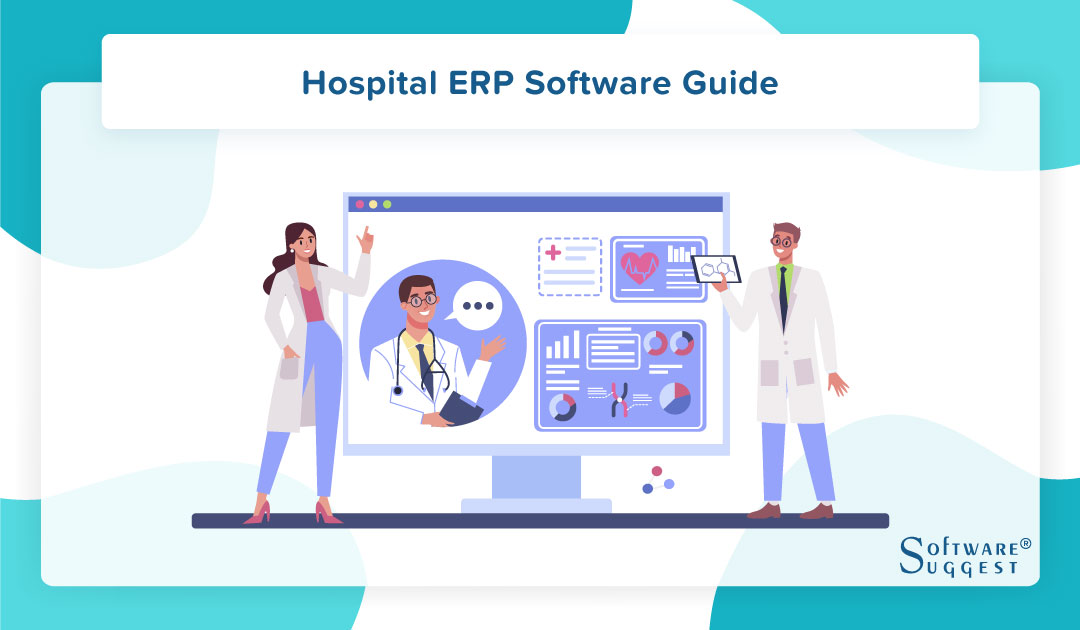
Hospitals have to manage many aspects in terms of paperwork, employee management, resources, etc. And this is where an ERP system becomes crucial for a hospital. This approach can help hospitals simplify and create enhanced patient management processes.
What Is a Hospital ERP Software?
A hospital ERP (Enterprise Resource Planning) system is a software solution created exclusively for hospitals and other healthcare facilities to optimize processes and boost efficiency.
A hospital's administration, finance, human resources, patient management, inventory management, and supply chain management are all combined into one platform by the ERP software.
A hospital ERP software’s major goals are to boost operational effectiveness, cut costs, and deliver improved patient care. Routine operations like appointment scheduling, patient registration, invoicing, inventory management, and HR management are automated by the system, freeing up staff members' time to concentrate on delivering high-quality healthcare services.
What Role Does the Hospital ERP Software Play?
Hospital ERP software is critical in the healthcare industry, helping hospitals and healthcare organizations improve operational efficiency, quality of care, and financial management. Here's a breakdown of the hospital ERP System's different roles.
A centralized platform for handling information about patient care, medical records, appointments, billing, and other topics is offered by the hospital ERP software. This allows authorized people across the company to access all pertinent information, facilitating improved patient care and more informed decision-making.
Moreover, this platform helps healthcare providers deliver high-quality care by providing real-time access to patient data and medical records. This helps healthcare professionals make more informed decisions, improve patient outcomes, and deliver a better patient experience.
By maximizing resource utilization, enhancing operational effectiveness, and minimizing waste, the hospital ERP software may assist healthcare businesses in cutting expenses. Hospitals can offer better treatment at a lower cost by streamlining procedures and lowering administrative constraints.
Benefits of Hospital ERP Software
Hospital ERP software is a powerful tool for healthcare organizations that can help improve efficiency, reduce costs, and provide better patient care. Some of the key benefits of ERP medical software include the following.

-
Simple maintenance of medical records
ERP for the hospital management systems makes it simple to access, share, and update patient records by digitizing medical records and storing them in a centralized database. This lessens the need for manual record-keeping, streamlines the upkeep of medical records, lowers the possibility of errors, and frees up time.
-
Automation
The hospital ERP software automates routine administrative duties, including appointment scheduling, patient registration, and insurance claim processing. This increases operational effectiveness and lightens the strain on hospital employees, freeing them up to concentrate on giving patients high-quality treatment.
-
Lowered operational costs
By automating administrative chores and maximizing resource usage, the hospital ERP software can assist healthcare businesses in reducing operational expenses. This entails lowering waste, eliminating the need for human work, and enhancing supply chain management.
-
Improved patient safety and satisfaction
The hospital ERP software can improve patient safety by giving healthcare professionals immediate access to patient data, medical records, and other pertinent information. This facilitates better decision-making and care delivery for healthcare personnel, enhancing patient outcomes and satisfaction.
-
Streamlining healthcare process
The hospital management system ERP helps healthcare professionals manage appointments, patient records, and other administrative duties by streamlining healthcare procedures. By doing so, operational efficiency is increased, while managing these processes takes less time and effort.
-
Aiding supply chain management
By offering real-time inventory management, automated procurement, and improved tracking of medical supplies, healthcare ERP software can assist healthcare firms in better managing their supply chains. This enhances supply chain management and lowers the chance of stock-outs, which could impact patient care.
-
Increasing financial forecast accuracy
The hospital ERP software provides precise financial data that aids healthcare organizations in improving their forecasting accuracy and making better financial decisions. Forecasting for revenue, costs, and capital investments falls under this category.
-
Simpler compliance
The hospital ERP software makes it easier to comply with legal and industry norms and regulations by offering a single platform for managing compliance-related tasks. HIPAA, HITECH, and other legal regulations are included here.
-
Business intelligence and strategic planning
Hospital ERP solution provides healthcare organizations with powerful business intelligence tools to help them identify trends, monitor performance, and make data-driven decisions. This improves strategic planning and decision-making, enabling healthcare organizations to improve patient outcomes and manage costs more effectively.
What Is the Need for a Hospital ERP Software?
A Hospital ERP (Enterprise Resource Planning) System is a comprehensive software solution designed to help healthcare organizations manage various aspects of their operations. There are several reasons why hospitals and other healthcare organizations need an ERP System, including.

-
Centralized data management
Large amounts of data, such as patient records, medical histories, billing details, and inventory data, are produced and managed by the healthcare industry. This data can be managed centrally by an ERP system, which makes it simpler to access, update, and analyze.
-
Enhanced patient care
An ERP system provides healthcare providers access to real-time patient data, enabling them to make more informed decisions and provide better patient care. It also streamlines healthcare processes, reducing wait times and improving the patient experience.
-
Cost reduction
ERP systems can help healthcare organizations reduce costs by optimizing resource utilization, reducing waste, and improving supply chain management. It can also help reduce the risk of errors and the need for manual labor, further reducing costs.
-
Regulatory compliance
Healthcare organizations are subject to various regulatory requirements, such as HIPAA and HITECH. An ERP system provides tools to help ensure compliance with these regulations and avoid penalties.
Key Features of Hospital ERP Software
There are many features of the Hospital ERP system that help the hospital to streamline the process and reduce manual tasks; here are some key features:
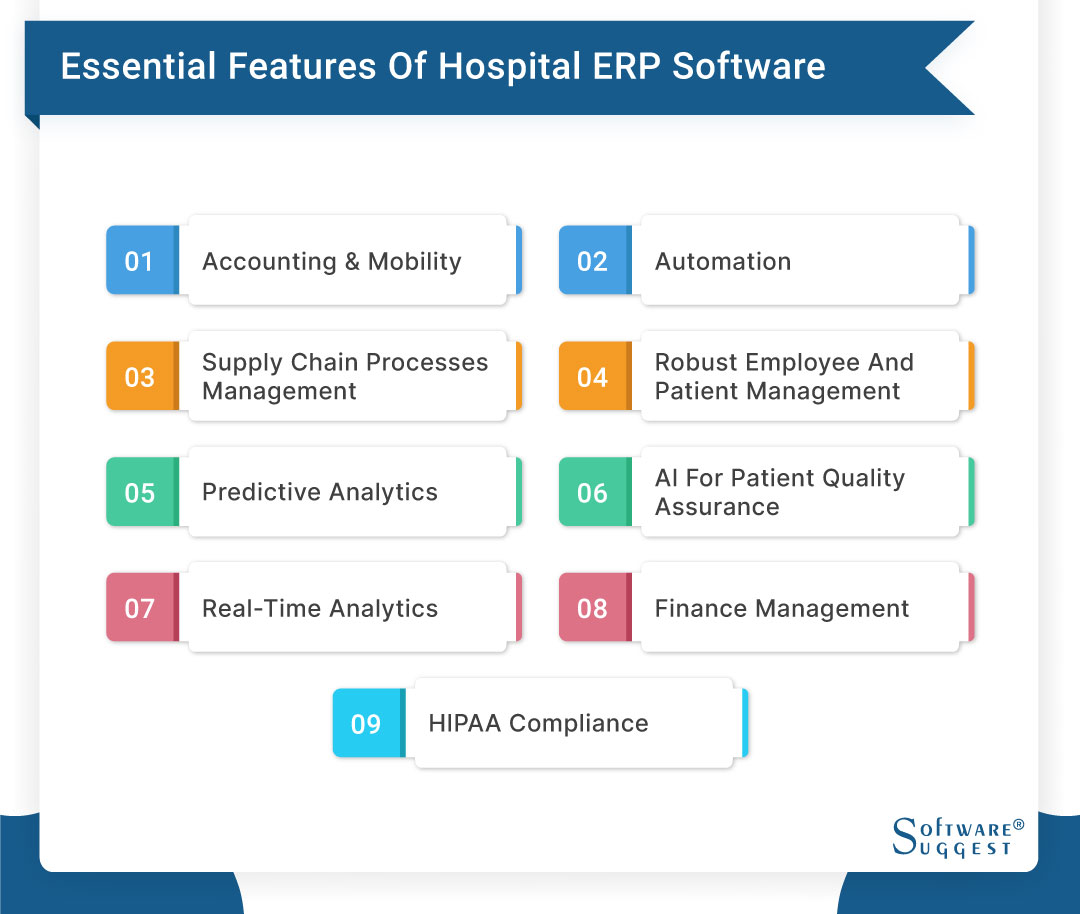
-
Accounting & Mobility
Strong accounting features are provided by hospital ERP systems, enabling hospitals to manage their money and make wise financial decisions. These systems also offer mobility, enabling personnel to view financial data from any location using portable devices.
-
Automation
Several administrative duties are automated by hospital ERP systems, decreasing the need for human data entry and the possibility of mistakes.
-
Supply chain processes management
Hospital ERP software includes solutions for managing supply chain operations, such as vendor management, inventory management, and procurement. As hospitals expand and diversify, these solutions optimize supply chain processes.
-
Robust employee and patient management
Hospital ERP software offer tools for managing personnel schedules, payroll, and benefits. Hospitals can use these systems to handle patient information, such as medical histories, appointment schedules, and billing data.
-
Predictive analytics
Hospital ERP systems use predictive analytics to examine massive amounts of data and offer insights into patient outcomes, illness prevalence, and other important variables affecting hospital operations.
-
AI for patient quality assurance
Hospital ERP software leverages artificial intelligence to monitor patient data in real-time and provide insights into patient outcomes. This helps hospitals improve patient care and reduce the risk of adverse events.
-
Real-time analytics
Hospital ERP platform provides real-time analytics that allows hospitals to monitor key performance indicators, track patient outcomes, and identify areas for improvement.
-
Finance management
Hospital ERP software provides robust financial management tools that allow hospitals to manage their finances, including budgeting, financial reporting, and forecasting.
-
HIPAA compliance
Hospital ERP software provides tools to help hospitals comply with the Health Insurance Portability and Accountability Act (HIPAA), including data encryption, access controls, and audit trails. This helps hospitals protect patient data and avoid regulatory penalties.
Types of Hospital ERP Systems
Hospitals can choose different types of ERP systems based on their requirements. Below are the main types of Hospital ERP systems.
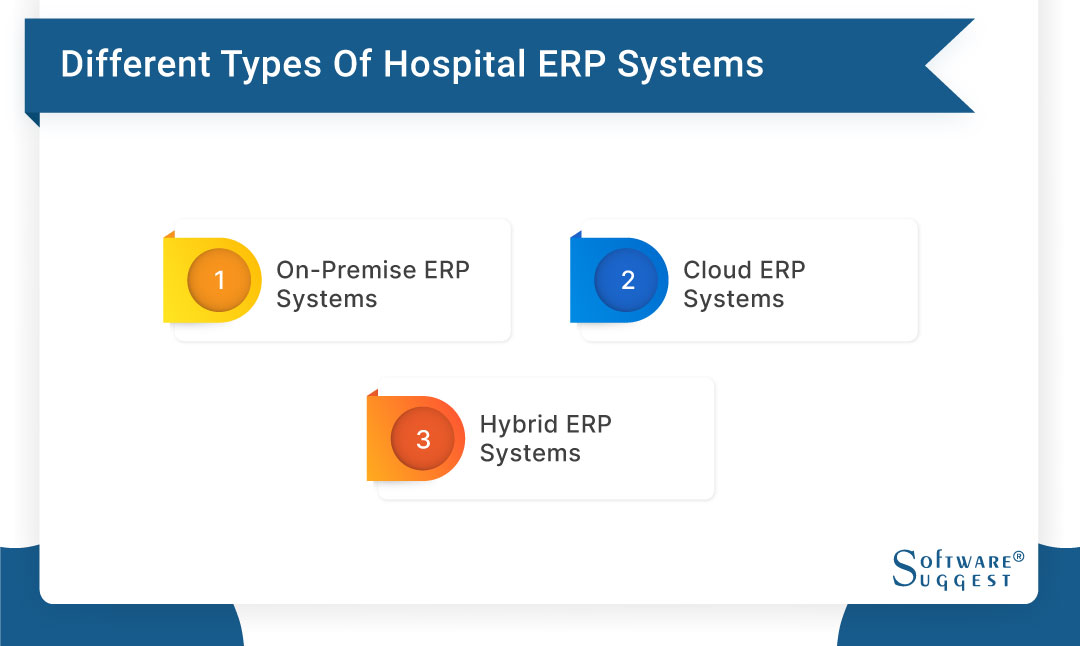
-
On-premise ERP systems
ERP systems are installed and run on-site at the healthcare facility. Large healthcare facilities with IT infrastructure and a devoted staff of IT experts to operate and maintain the system are best suited for this kind of system. ERP systems installed on-site can be modified to match the particular requirements of the healthcare organization.
Given that all data is kept on-site, they provide high security and data control levels. However, on-premise systems might have substantial continuing maintenance expenses and require a sizable initial investment in hardware and software.
-
Cloud ERP systems
Internet access is required to use cloud-based ERP systems hosted in the cloud. Small healthcare facilities that lack the resources or IT know-how to run an on-premise ERP system should use this kind of system.
Because they can be customized and scaled without extra hardware or software investments, cloud hospital ERP solutions offer scalability, flexibility, and affordability. Because cloud providers often use the most recent security techniques and provide high security and data protection levels
-
Hybrid ERP systems
Hybrid ERP systems are a combination of on-premise and cloud-based ERP systems. This type of system is ideal for developing healthcare institutions that may not have the resources to implement a full on-premise ERP system but still require some customization and control.
Hybrid ERP systems allow healthcare institutions to choose which modules they want to host on-premise and which ones they want to host on the cloud. This type of system offers the benefits of both on-premise and cloud-based systems, including high levels of security, customization, scalability, and affordability
Components of Hospital ERP System
A Hospital ERP System is a comprehensive software solution designed to help hospitals manage their operations, improve patient care, and increase efficiency. It includes many components; below are the important components:
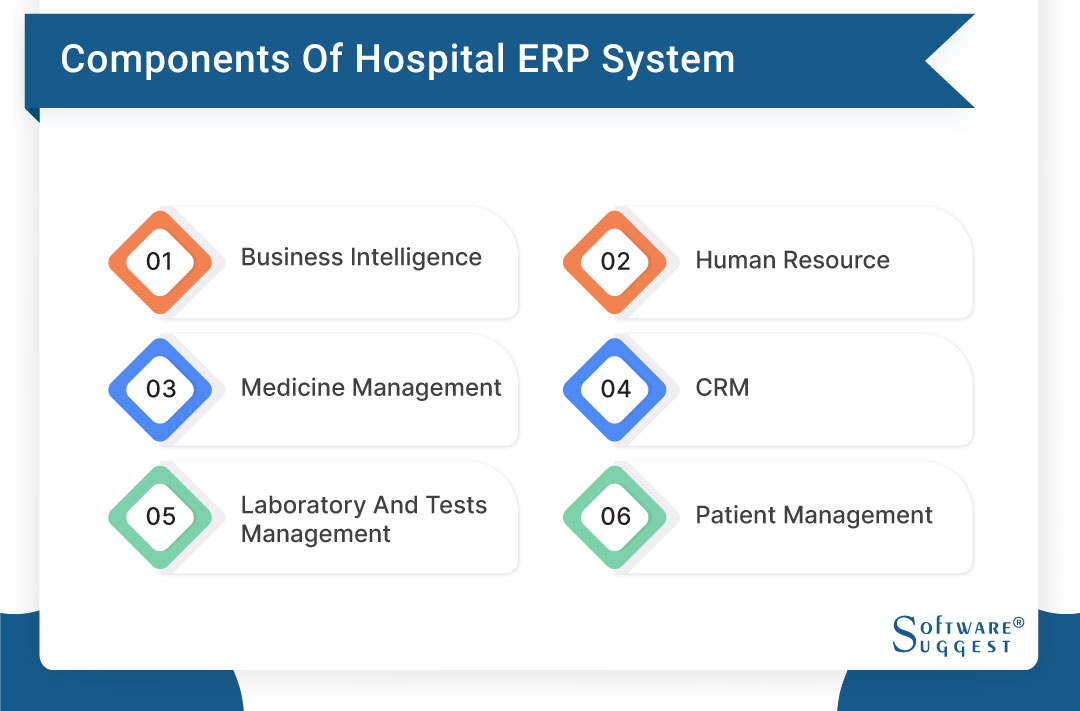
-
Business intelligence
Data from numerous sources inside the hospital must be gathered, examined, and interpreted by this element of an ERP system for hospitals. These data range from financial to patient to operational to other types. The Business Intelligence component can offer insights and trends to assist the hospital administration in making choices by utilizing cutting-edge data analytics tools and algorithms.
-
Human Resource
This part oversees the management of the hospital's staff, including hiring, employee scheduling, payroll, and training. Additionally, it keeps track of employee attendance, performance, and benefits.
-
Medicine management
This part oversees the acquisition, storage, dispensing, and tracking of all pharmaceuticals in the hospital's pharmacy. The hospital can improve its inventory and cut waste by using reports on drug utilization patterns and tracking medicine usage.
-
CRM
Customer Relationship Management (CRM) is a crucial component of healthcare ERP solutions that manage patient interactions, including appointment scheduling, patient feedback, and patient satisfaction. It also provides a patient portal to access their medical records, pay their bills, and communicate with their doctors.
-
Laboratory and tests management
This element oversees all aspects of laboratory testing, including sample collection, analysis, and reporting. Also, it looks after the tools, chemicals, and other materials needed for laboratory tests.
-
Patient management
This component manages the patient's medical records, including their medical history, diagnosis, treatment, and follow-up care. It also tracks the patient's appointments, visits, and billing information. This component ensures the continuity of care across different departments and enables the hospital to provide high-quality patient care.
How Does the Hospital ERP Software Keep Your Business Scalable?
Hospital ERP software can help keep your business scalable in several ways. Here are some ways.

-
Centralized data management
Hospital ERP software provides a centralized database for storing and managing all the data pertaining to hospital operations. Large data sets are now simpler to handle and analyze, empowering hospital administration to make wise decisions and prepare for future expansion.
-
Automation of processes
Hospital ERP software can automate many routine tasks such as scheduling appointments, managing patient records, inventory management, and billing, freeing up staff time to focus on higher-value tasks. Automation also reduces the risk of errors and increases efficiency, enabling hospitals to scale without adding more staff.
-
Modular design
Hospital ERP software is modular in design, meaning that you can start with basic modules and add more as your hospital grows. This scalability ensures that the system can keep pace with the hospital's needs, and allows for a phased implementation, minimizing disruption and ensuring smooth operations.
-
Real-time visibility
Hospital ERP software provides real-time visibility into hospital operations, enabling management to monitor key performance indicators and identify improvement areas. This allows hospitals to optimize processes, improve patient outcomes, and scale operations efficiently.
Considerations while Selecting Hospital ERP Software
Choosing the right hospital ERP software requires careful consideration of factors such as scalability, industry orientation, user-friendliness, implementation time, ROI, integrations, and security.
By carefully evaluating the below factors, hospitals can choose a system that meets their unique needs and helps them achieve their goals.
-
Scalability
The hospital ERP software should be scalable and adaptable enough to meet the hospital's changing needs. This entails managing much data, introducing new modules when required, and adjusting for increased patients, employees, and facilities.
-
Industry-oriented
With features and functionalities customized to the specific requirements of hospitals, clinics, and other healthcare providers, the Hospital ERP software should be created specifically for the healthcare sector.
-
User-friendly
The user interface of the hospital ERP software should be simple, clear, and easy to navigate. This is crucial to ensure workers can use the system quickly and easily, lowering the possibility of errors and boosting productivity.
-
Short implementation time
Hospital operations should not be significantly disrupted during the rapid and simple implementation of the hospital ERP system. This implies that the system should be pre-configured and adaptable and offer thorough training and support to assist staff in swiftly getting up and running.
-
Higher ROI
The hospital ERP software should achieve a higher return on investment (ROI) through more productivity, lower expenses, and higher income. Therefore, the system should be able to automate repetitive procedures, lessen errors, expedite workflows, and offer real-time visibility into hospital operations.
-
Integrations
The hospital's enterprise resource planning (ERP) system should be able to interact with other software and hardware, including electronic health records (EHRs), medical equipment, and financial systems. This lowers the chance of errors and increases efficiency by ensuring that data is correct and current across all systems.
-
Security
The hospital ERP software should offer strong security features like data encryption, access limits, and audit trails. This guarantees that sensitive data, such as medical information, is protected from intrusions and illegal access.
Top 5 Hospital ERP Software: Comparison
Before selecting any ERP system for your hospital, you need to compare different options. Below is the list of the top 5 ERP systems for hospitals.
|
Name
|
Free Trial
|
Demo
|
Starting Price
|
|---|---|---|---|
Epicor |
30 Days |
Yes |
$150/user/month |
Oracle Netsuite |
14 Days |
Yes | $999/month |
Sage Intacct |
30 Days |
Yes |
Custom pricing upon request |
SAP Business One |
Varies |
Yes |
$56/user/month |
Acumatica |
Varies |
Yes |
Custom pricing |
1. Epicor

The leading corporate software vendor Epicor provides large and mid-sized companies with industry-specific ERP (Enterprise Resource Planning) solutions. The company's software solutions aid companies in streamlining operations, increasing productivity, and improving efficiency.
The software from Epicor contains modules for customer relationship management, manufacturing, supply chain management, and human capital. The program may be adapted to match each organization's particular needs because of its great degree of customizability.
Features
- Financial management
- Cash management
- Financial reporting
- Supply chain management
- Manufacturing modules
- Human capital management
- Customer relationship management
- Business intelligence tools
Pros
- A comprehensive suite of features
- Scalability
- Customizability
- User-friendly interface
- Business intelligence tools
Cons
- Cost
- Implementation time
- Complexity
- Support
- Integration
Pricing
- Epicor ERP: $175 per user per month
- Epicor Kinetic: $225 per user per month
- Epicor Prophet 21: Custom pricing
2. Oracle Netsuite

Oracle Netsuite is a cloud-based enterprise resource planning (ERP) software that helps businesses manage their financials, inventory, supply chain, procurement, and order management processes.
It is designed to provide real-time visibility and insights into business operations, improve operational efficiency, and streamline workflows across different departments.
Netsuite also offers modules for customer relationship management (CRM), human resources (HR), and e-commerce, making it a comprehensive solution for businesses of all sizes.
Features
- Accounting and financial management
- Customer relationship management (CRM)
- Warehousing and manufacturing management
- Inventory management
- Analytics and Reporting
- Order management
- E-commerce
Pros
- Comprehensive functionality
- Cloud-based
- Customization
- Integration
Cons
- Cost
- Complexity
- Support
- User interface
Pricing
- Netsuite ERP: $999 per month
- Netsuite CRM: $129 per user per month
- Netsuite SuiteCommerce: $1,999 per month
3. Sage Intacct
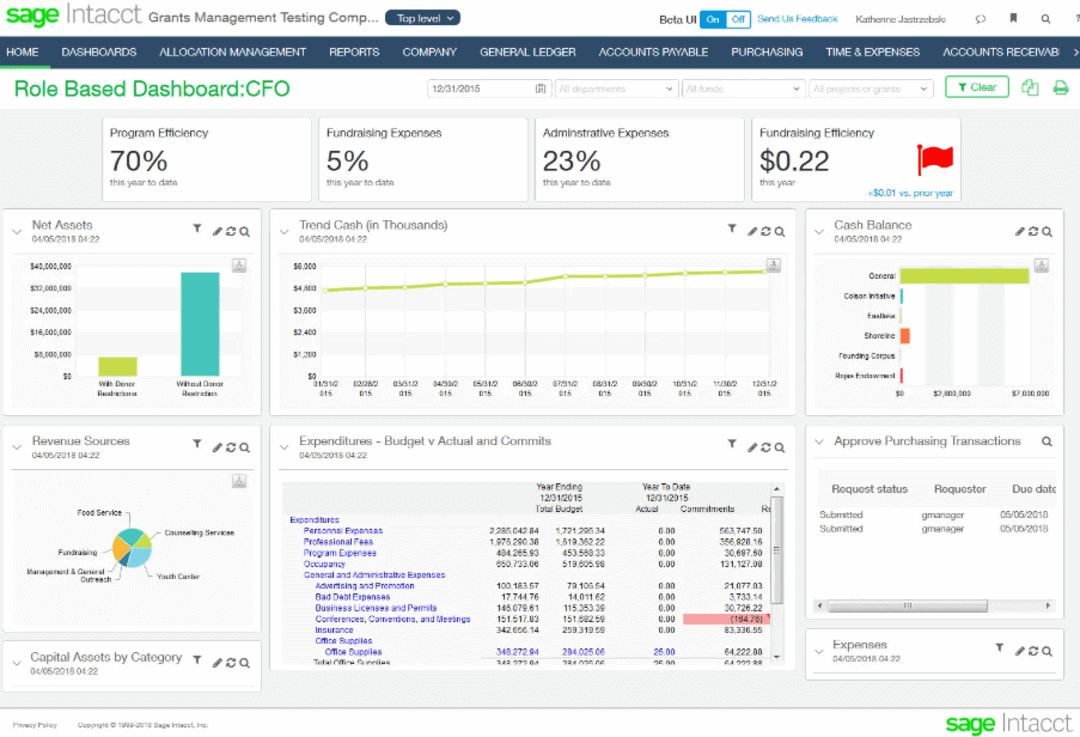
Sage Intacct, a cloud-based accounting program, assists small and mid-sized enterprises in streamlining their financial operations. Accounts payable, accounts receivable, general ledger, cash management, and financial reporting are just a few of its functions.
Because of its adaptability, scalability, and usability, Sage Intacct is well-known. Businesses may adapt their accounting software to meet their unique demands thanks to its integration with various third-party programs.
Features
- General ledger
- Cash management
- Reporting and analytics
- Inventory management
- Multi-currency and multi-entity support
- Deal management
- Email management
- Inventory management
- Task management
Pros
- Cloud-based
- Scalability
- Customization
- Automation
- Reporting
Cons
- Cost
- Learning curve
- Limited integrations
- Limited customization without coding knowledge
- Customer support
Pricing
- On Request
4. SAP Business One

Popular enterprise resource planning (ERP) software SAP Business One was created with small and mid-sized organizations in mind. It offers a variety of functions, including reporting and analytics, purchasing and procurement, inventory and production management, sales and customer management, and finance management.
Because SAP Business One is a modular solution, companies may adopt only the necessary modules and add more as those needs evolve. It is renowned for its adaptability, scalability, and capacity to help companies in various industries.
Features
- Financial management
- Sales and customer management
- Purchasing and procurement
- Inventory and production management
- Time tracking
- Transaction monitoring
- User management
- Vendor management
Pros
- Scalability
- Integration
- Reporting
- User-friendly
- Customer support
Cons
- Cost
- Complexity
- Limited third-party integrations
- Maintenance
- Limited industry-specific functionality
Pricing
- Limited License: $56 per user per month
- Professional License: $108 per user per month
5. Acumatica

Enterprise resource planning (ERP) software for the cloud called Acumatica offers a full range of company management solutions for small and medium-sized organizations. It provides capabilities for managing finances, goods, projects, customers, etc.
Users can select between an on-premises or cloud-based implementation with Acumatica, renowned for its flexible deployment choices. Its open architecture makes customization and application integration simple.
Features
- Activity tracking
- Backorder management
- CRM
- Client Portal
- Collaboration tools
- Commercial
- Job management
- Work order management
- Workflow management
- Cash management
- E-commerce management
Pros
- Flexibility
- Scalability
- Cloud-Based
- Integration
- User-friendly
- Comprehensive Functionality
Cons
- Complex
- Limited Third-Party Support
- Limited Industry-specific Features
- Limited mobile app functionality
Pricing
- Custom pricing
Steps to Implement Hospital ERP Software
To implement the right Hospital ERP system, the hospitals should follow the correct process of implementation; below are the steps to follow:
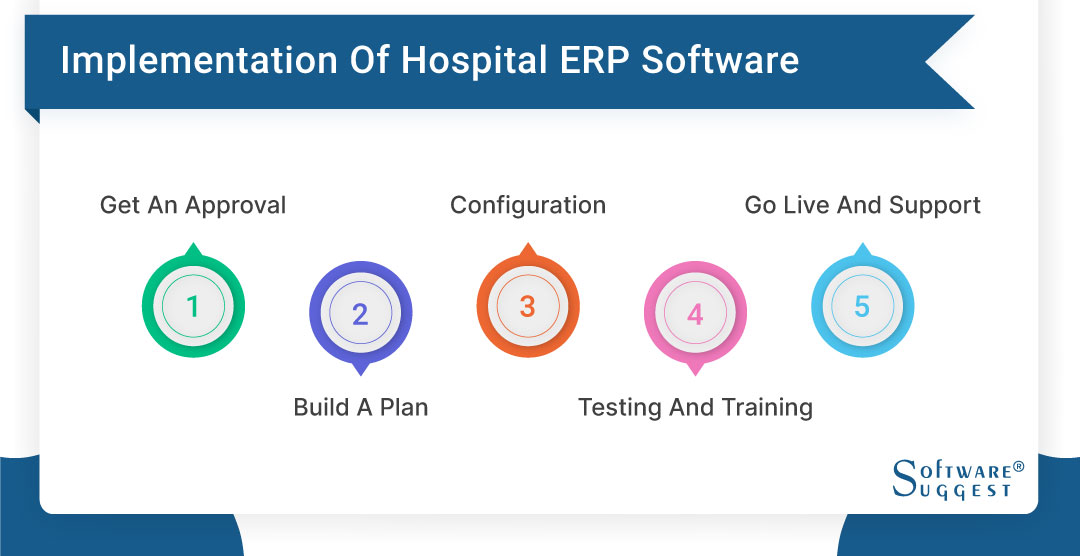
-
Get an approval
Getting the go-ahead from the hospital administration is the first step in implementing an ERP system for hospitals. Presenting a business case that lists the advantages of the ERP system, such as better patient outcomes, enhanced operational efficiency, and lower costs, may be part of this.
-
Build a plan
Following receipt of permission, a thorough implementation plan is created. This strategy should include a schedule, a list of the necessary resources, and a project budget, which can be done using a project management platform. Also, it needs to describe the objectives of the ERP system and how they will be met.
-
Configuration
The Hospital ERP System must be configured to match the facility's unique requirements. This could entail modifying workflows, establishing new user roles, and setting up system integrations. Data migration from legacy systems to the new ERP system may also be necessary.
-
Testing and training
Once the Hospital ERP System has been set up, it is crucial to properly test it to ensure it meets the hospital's requirements. User acceptability testing (UAT) and system integration testing may be required (SIT). To guarantee that hospital staff members are comfortable with the new system and its capabilities, extensive training must be given to them.
-
Go live and support
The last phase in deploying a hospital ERP system is going live with the new one. To do this, the old system must be migrated to the new one, and the new one must be fully functional. To guarantee that hospital employees can continue to use the system efficiently, it is also crucial to give continuing support. This could entail offering help desk assistance, performing system upkeep, and handling problems.
Challenges Faced in Hospital ERP Software
Implementing and using ERP software for hospitals can be challenging due to below factors. To overcome these challenges, hospitals must choose the right software, invest in training and support for staff, and continuously evaluate and update their processes and technology.
-
Manual Processes and Paper Checks
Transitioning away from manual processes and paper-based checks is one of the main problems with hospital ERP software. Hospitals frequently have procedures that heavily rely on human data entry, which can result in mistakes, inefficiencies, and a lack of visibility into operations.
-
Medical Supplies Management and Supplier Relationship Management
The management of medical supplies and supplier relationships presents another difficulty for hospitals. Hospitals can manage orders, keep track of expiration dates, and track inventory using ERP software. Yet, dealing with several vendors can make managing supplier relationships and contract negotiations challenging.
-
Poor HIPAA Compliance
Hospitals are required to comply with strict privacy and security regulations under HIPAA. Failure to comply can lead to costly fines and damage to the hospital's reputation. Hospital ERP software should have robust security features, including encryption, access controls, and audit trails, to ensure compliance with HIPAA regulations.
-
Lack of Insight into Expenses
Hospital ERP software should provide a complete view of the hospital's financials, including revenue, expenses, and profitability. However, some hospitals struggle to get a clear picture of their expenses, particularly when tracking expenses related to specific procedures or patient groups.
-
Cybersecurity
Hospitals are a prime target for cyber-attacks due to the sensitivity of the data they store. Hospital ERP software should be secure against cyber threats, including malware, ransomware, and phishing attacks. However, many hospitals struggle to keep up with the latest security threats and may lack the resources to invest in robust cybersecurity measures.
What Is the Average Cost of a Hospital ERP System?
The pricing of a Hospital ERP system can vary depending on various factors, such as the size of the hospital, the number of modules required, the level of customization, and the vendor's pricing model. Generally, Hospital ERP systems are priced on a per-user basis or a subscription-based model.
-
Per-user pricing model
In this pricing model, the hospital pays a fixed amount per user or per seat. The more users or seats the hospital requires, the higher the cost. This pricing model is suitable for smaller hospitals or clinics with limited users.
-
Subscription-based model
The hospital pays a recurring subscription fee to access the Hospital ERP system in this pricing model. The subscription fee is usually based on the number of modules required, the level of customization, and the number of users. This pricing model suits larger hospitals with multiple departments and many users.
The cost of implementing a Hospital ERP system can also vary depending on the vendor's implementation and training costs. Some vendors offer additional services such as data migration, customization, and maintenance, which can add to the total cost.
Conclusion
A Hospital ERP system is a potent instrument that may assist hospitals in managing their operations, enhancing patient care, and boosting efficiency. Hospital ERP systems offer a complete solution for managing all facets of hospital operations by combining multiple modules such as patient management, medication management, laboratory management, and business intelligence.


.png)





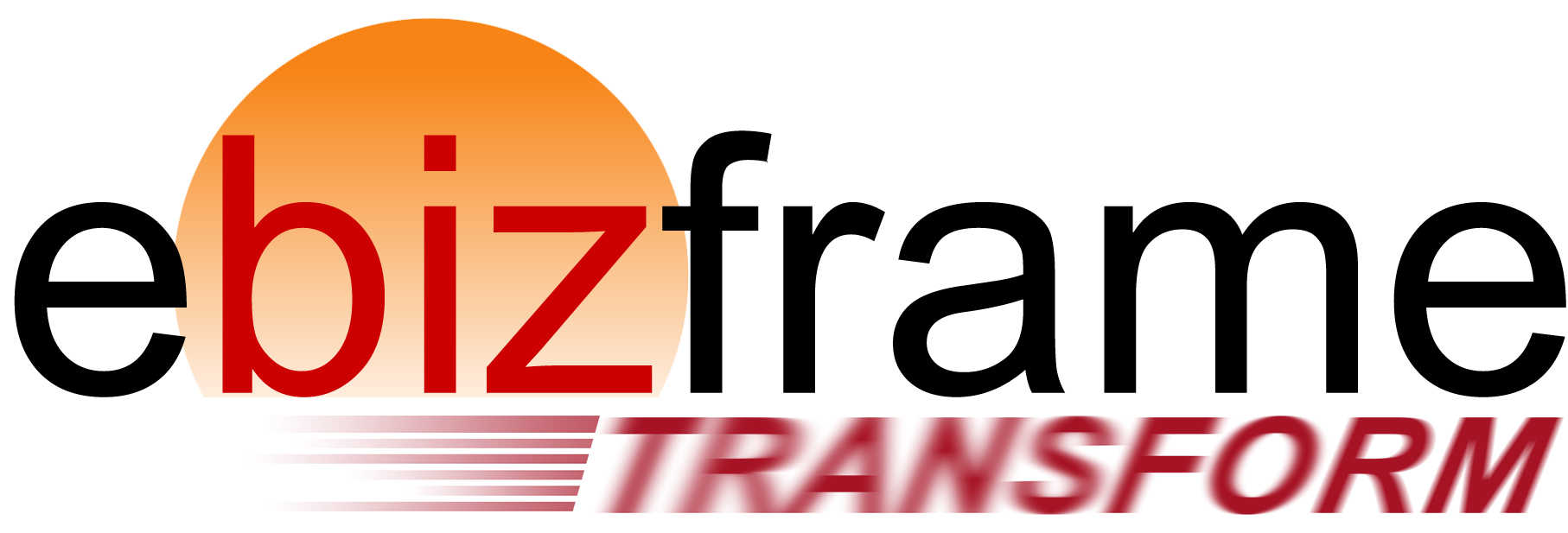



.png)




